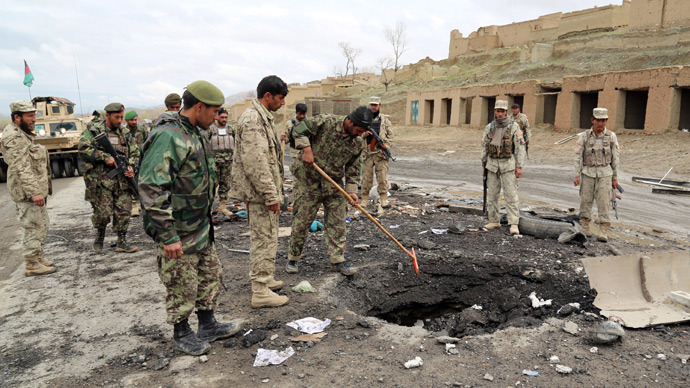Billions of US tax dollars potentially funding Afghan terrorism – report

Grey areas in US legislation could mean that taxpayer money is financing Afghan terrorism, a report has revealed. It calls on Congress to change the $100,000 threshold on reconstruction contracts to include the 80 percent that evade scrutiny.
The “alarming” findings were greeted with calls for
urgent action to mend the weak links in US regulations.
The report, titled ‘Contracting with the Enemy’ and published by
the Special Inspector General for Afghanistan Reconstruction
(SIGAR), draws attention to the mismanagement of the Department of
Defense’s (DOD) funds.
According to the document, such oversights mean that
“millions of contracting dollars could be diverted to forces
seeking to harm US Military and civilian personnel and derail the
multi-billion dollar reconstruction effort.”
Last year, the US invested around $1.7 million and awarded 9,733
contracts in Afghanistan; it is unclear how much of this may have
been diverted to the insurgency.
Criticism in the report focuses on Section 841 of the National
Defense Authorization Act 2012 and its ambiguous wording. The
legislation allows the DOD to discontinue a contract with a company
found to have links to Afghan insurgent groups.
However, blunders in the section’s wording make it likely that
US money is slipping through the net and contributing to
terrorism.
Firstly and most importantly, Section 841 only applies to
contracts over $100,000 which excludes approximately 80 percent of
Afghan contractors. Secondly, the report found that many of the
contractors are not made aware of their legal obligation to avoid
companies with insurgent links.
Furthermore, information on companies that have been blacklisted
under Section 841 is not properly disseminated by the DOD:
“CENTCOM [Central Command] began posting Section 841
designations on its public website in January 2013; however,
contracting officers and prime contractors are not required to
regularly review the information,” the report
explained.
Finally, Section 841 will expire when US forces pull out in
2014, increasing the danger of funds being funneled to extremist
groups.
“SIGAR currently has 73 open recommendations. If all of them
were accepted, the U.S. government could potentially save about
$450 million,” said John Spoko, Special Inspector General for
Afghanistan Reconstruction to press. He went on to say that the US
government had failed to implement an anti-corruption plan that had
been previously put forward.
“More than two years ago, SIGAR recommended that the United States develop an integrated anti-corruption strategy. Although the U.S. Embassy in Kabul produced a draft strategy, it was not adopted,” he said.\
This is not the first time the US has come under fire for its
mismanagement of funds in Afghanistan. In July of last year, SIGAR
warned that many of the reconstruction projects that the US had
invested in were behind schedule, and would not be finished before
the full troop withdrawal in 2014. SIGAR said the “expectations
gap” caused by the unfinished projects could impair
stabilization efforts.
Meanwhile, as the deadline for the US withdrawal closes, there
is little evidence to suggest Afghanistan will be in stable
condition when the US leaves. A coordinated insurgent attack on
April 3 killed 34 civilians and 10 security force members in the
most deadly attack in over a year.














